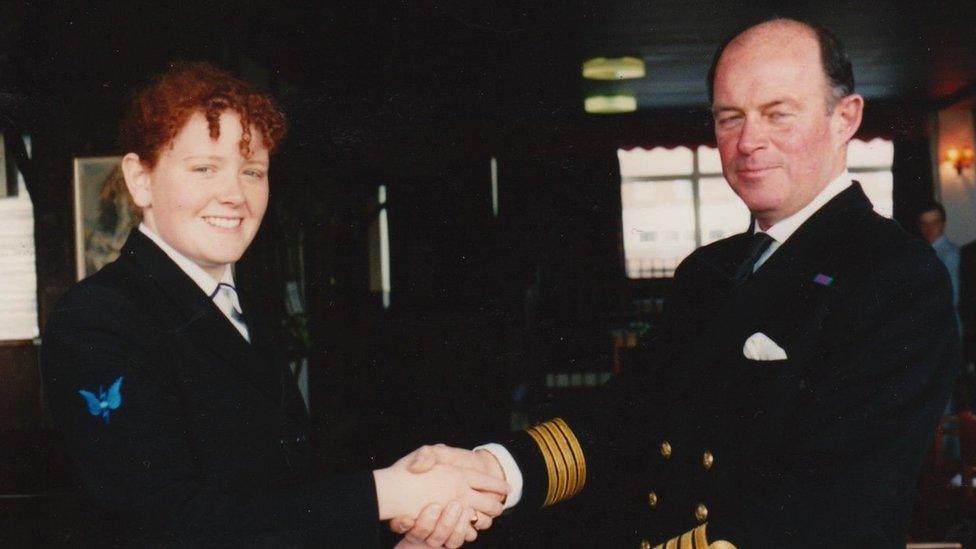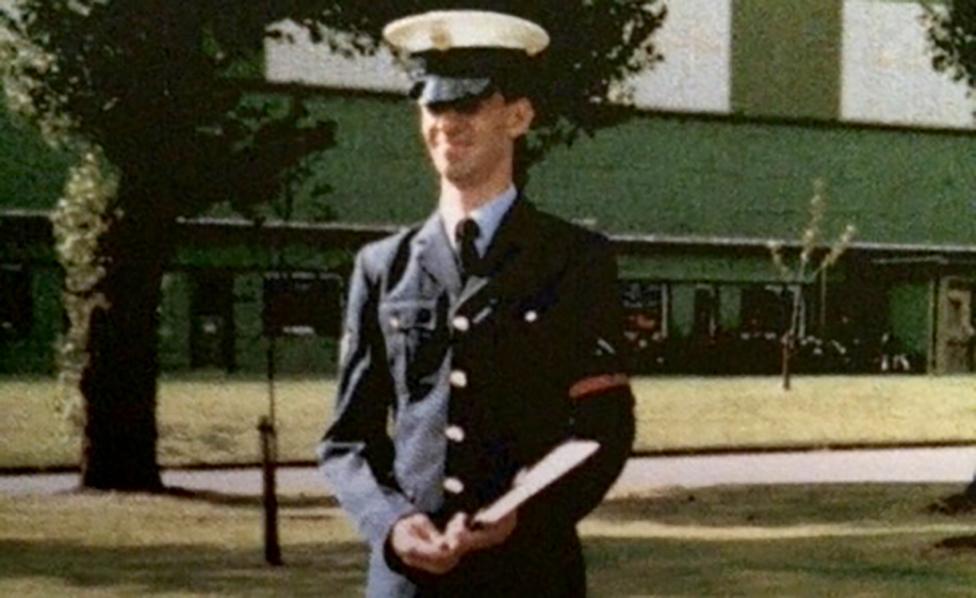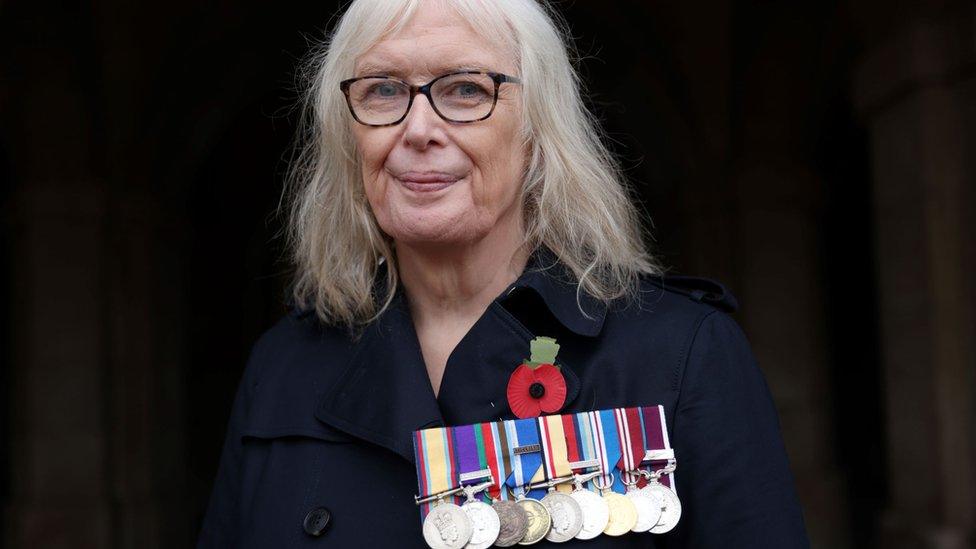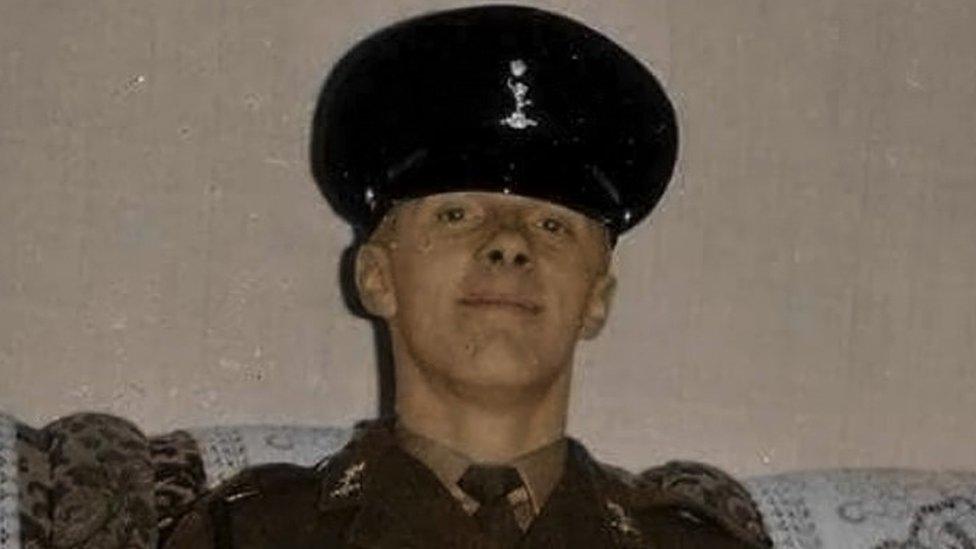Rishi Sunak apologises to LGBT veterans for past armed forces gay ban
- Published

Radio operator Emma Riley was discharged from the Navy for being a lesbian in the 1990s
Rishi Sunak has apologised for the historical treatment of LGBT veterans who were sacked or forced out of the military for being gay.
The PM called the ban an "appalling failure" of the British state.
It was illegal to be gay in the British military until 2000 - with thousands of veterans thought to be affected.
A report, external into their treatment recommended they be given a financial reward and that the PM publicly apologise.
Addressing MPs, the prime minister said: "Many endured the most horrific sexual abuse and violence, homophobic bullying and harassment all while bravely serving this country."
The LGBT Veterans Independent Review, led by Britain's first openly gay judge Lord Etherton, began last year and heard about the experiences of 1,145 veterans between 1967 to 2000.
Homosexuality was decriminalised in the UK in 1967 but a ban continued in the armed forces. According to the report, the Ministry of Defence said at the time that justification for the policy included "maintenance of operational effectiveness and efficiency" - but the report said there had been an "incomprehensible policy of homophobic bigotry" in the armed forces.
It heard shocking accounts of homophobia, bullying, blackmail, sexual assaults, "disgraceful" medical examinations, and conversion therapy.
It makes 49 recommendations to the government including:
Affected veterans to be given an "appropriate financial reward" capped at £50m overall
The restoration of medals that had to be handed back on dismissal or discharge
The clarification of pension rights
The presentation of a special veterans' badge
The government said it would respond in full after summer recess.
Some of the veterans affected watched the PM's public apology.
One of them, Emma Riley, 51, was a Royal Navy radio operator for three years before she was arrested and discharged for being a lesbian after telling a colleague her sexuality in the early 1990s.
She told BBC News she welcomed the report, and hoped it would be put into place "swiftly."
"Having our history, experiences and enormous pain acknowledged and apologised for, hearing that the armed services and government that perpetuated institutional bullying will now be held accountable to finally support LBGT+ veterans, is a relief," she said.
Veterans have previously told the BBC how their lives were devastated by the ban.
Carol Morgan, who was dismissed after telling her bosses she was gay in 1978, kept her sexuality secret for another 30 years and said she had been "robbed" of her life.

Ken Wright, 62, served in the Royal Air Force Police before losing his job when his bosses found out he was gay.
He described how losing his position in the military had left him feeling as though "his country didn't want him."
He added: "After being denied the opportunity to defend one's country, being told you aren't good enough to wear the uniform, it takes huge inner strength to feel reconciled all of a sudden today.
"Carrying that insult for 35 years scars you for life."
Olympian Dame Kelly Holmes, who served in the army and came out as gay last year, called the publication of the report a "historic moment", while Catherine Dixon, a former army officer who is now vice chair at Stonewall, said it was "an important step towards justice" for those whose military careers were "ruined" because of their sexuality.
"Many were imprisoned, experienced corrective violence and lived with the stain of criminal convictions because of who they loved and which left some homeless and many unable to work," she said.
The report says many faced invasive medical examinations, intrusive police investigations and in some cases, as recently as 1996, were sent to prison for their sexuality. Many still have a criminal record to this day.
It also details how some veterans faced a complete loss of income, while others were deemed ineligible to claim their pension because of their dismissal.
The report comes more than 20 years after four servicemen and women, who were sacked for being gay, won a case in the European Court of Human Rights and overturned the ban.
The armed forces charity Royal British Legion called on the government to accept the report's recommendations in full.
The charity's director general Charles Byrne welcomed both the report and Mr Sunak's "landmark apology", saying many people who had dedicated their lives to the country were "forced or felt pressured to leave the armed forces, and this mistreatment destroyed or shortened their career".
Following the report, Defence Secretary Ben Wallace said he was "deeply sorry" on behalf of the government and the armed forces.
"I say again to the veterans' community I'm deeply sorry for what happened to you. The very tolerance and values of western democracy that we expected you to fight for, we denied to you - it was profoundly wrong," he said in the House of Commons.
Veterans Minister Johnny Mercer also said he was pleased with the apology and that it was a "significant moment" for the LGBT community.
Rishi Sunak: "On behalf of the British state I apologise"
Related topics
- Published28 June 2023

- Published9 June 2023
